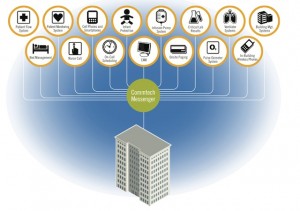 Pagers for healthcare are going the way of the dodo, according to middleware healthcare device maker Amcom. MobiHealthNews recently spoke to Amcom president Chris Heim and mobile product manager Brian Edds about their company's place in the evolving mHealth industry.
Pagers for healthcare are going the way of the dodo, according to middleware healthcare device maker Amcom. MobiHealthNews recently spoke to Amcom president Chris Heim and mobile product manager Brian Edds about their company's place in the evolving mHealth industry.
"When it comes to medical devices, input devices [oximeters, blood pressure monitors, glucometers, etc.] and output devices [smartphones, tablets] are getting more complex," said Heim."There's a divergent universe of options. Housekeeping still might have a pager, nurses carry WiFi phones, doctors have smartphones... and you have to find a way to communicate between them all."
Once doctors began adopting smartphones (now adoption has reached some 80 percent of MDs in the US), they quickly started using SMS as a way of communicating with other doctors and staff because of its speed and ease of use compared to older methods.
TigerText president and co-founder Brad Brooks recently stated that more than 70 percent of US physicians use text messages to discuss cases and exchange patient information with other physicians. Brooks made the comments during an online presentation last month.
"SMS is quick and simple, but not secure," Heim said. "It might not necessarily get to the correct doctor or the correct device... and it offers no accountability."
To combat that, Amcom's Mobile Connect logs every message sent and delivered. Doctors receiving urgent messages get notifications on platforms like Android, BlackBerry, and iOS. With this month's release of iOS5, Heim says alerts are even more efficient.
"With iOS5 [the notifications] are better now," he said. "You can see them organized by app, so users will see [the app name] AMC (Amcom Mobile Connect). It's much easier to differentiate." The Amcom app notifies users with a loud ringtone, and continues to alert every 30 seconds the doctor doesn't respond, for up to 5 minutes.
"There's a shift now from messaging to communications -- physicians want conversations, not pages," Heim said. With so many physicians caring for the same patient -- the average is about nine doctors contributing to the care of the average patient -- "patients want their doctors to to be able to talk to each other, not a chart."
In September, Amcom's Commtech messenger middleware received FDA clearance as a Class II medical device. Following the MDDS rule clarifications, it was clear to Amcom that its middleware now required clearance, based on the revised medical device regulations that published last February.
Paging giant USA Mobility acquired Amcom back in March for $163 million. The company said the acquisition would help "modernize" USA Mobility's messaging offerings, which are mostly paging systems. Despite the move by USA Mobility, not everyone believes that paging needs any more "modernization". Some in the pager industry don't feel that smartphones will ever fully replace pagers: Ted McNaught, president of paging carrier Critical Alert Systems, wrote an op-ed piece for MobiHealthNews in August that argued the cellular networks that smartphones run on and the devices themselves were not reliable enough to handle important healthcare messages and alerts.
Edds says that smartphone and tablets can be just as reliable as pagers, but there will be a long transition period.
"There's going to be [pagers] for a long, long, time... but they are declining in healthcare. When it was introduced, paging was simple. Everything came from a single source: one company offered both the hardware and network via a pager tower placed on top of a hospital building. But there are downsides," said Edds. "There is limited functionality, and you can't really respond to people."
Edds contends that though cellular signals have problems, like dead spots, the use of multiple networks, cellular in a combination with WiFi, helps protect against those dropout issues by providing redundancy.
Want to read stories as soon as they are posted? Follow MobiHealthNews on Facebook.
On Twitter? Be sure to follow MobiHealthNews for up-to-the-minute news and industry analysis.














